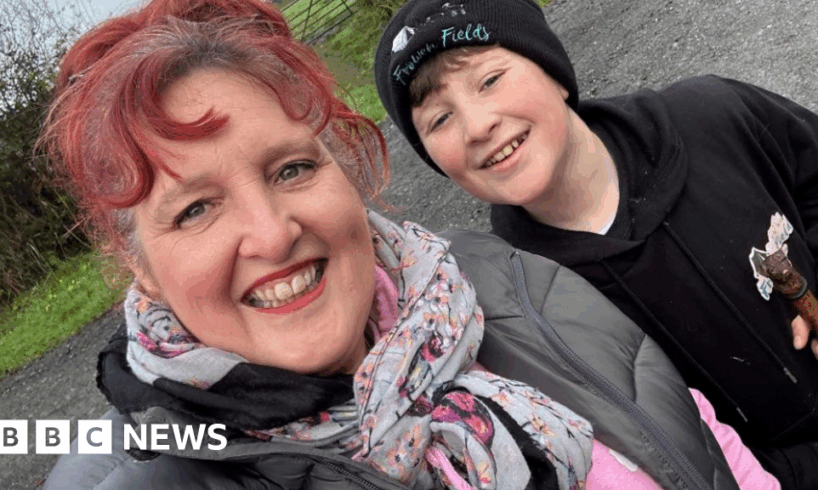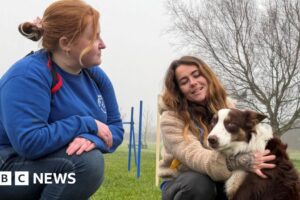
Necessary support group
Helen provides as much learning as she can at home for her 12-year-old autistic son Joe
When 12-year-old Joe’s family first moved to Wales during the Covid pandemic, his parents knew finding the right school was going to be tough.
Three primary schools and a “nightmare” transition to secondary later, he’s “basically had no education” for over a year, his mum said.
Joe, who is autistic and awaiting an attention deficit hyperactivity disorder (ADHD) assessment, is one of hundreds who fall in “the gap” between coping in mainstream school and qualifying for dedicated additional learning needs (ALN) settings.
In a recent update on Welsh government ALN reforms, Education Secretary Lynne Neagle announced an extra £8.2m “to improve delivery”, adding she had “listened carefully to concerns”.
“He once tried to get out of a moving van because he didn’t want to go,” said Joe’s mum, Helen.
Persistent absence from school – children absent 10% or more of the time – is about 80% higher than pre-pandemic levels.
It was 30.4% in the 2023-24 academic year, rising to 42.7% among ALN pupils.
Children who are neurodivergent – meaning their brain works and processes information differently to others – can struggle with attendance due to anxiety and burnout arising from their conditions.
Qualification for dedicated ALN settings is based on a “significantly greater difficulty in learning” or a disability that hinders the use of facilities at mainstream schools, but many parents say their child is either not classed as having severe enough needs or would not fit in that type of setting.
Parents of children with ALN said mainstream settings could be more inclusive if they had dedicated spaces for neurodivergent pupils to regulate themselves when overwhelmed, acceptance of uniform tweaks catering for texture sensitivities, consistent routines where possible and less focus on punishment for missed classes or assignments.
They agree that suitable alternative provisions must also be in place so children who cannot attend a formal setting, even temporarily, don’t halt their education.
Necessary support group
Joe enjoys learning through a variety of activities at home on his family’s farm – but the school environment is where he struggles
Joe, who lives on a farm in Login, Carmarthenshire, has a lot of energy and enthusiasm and is a member of his local youth council, but he struggles in school.
His attendance in Year 7 was 21% and it is 28% in Year 8 so far.
Helen said Joe’s teacher described him as “capable, but lacking self-esteem”.
She added: “I’ve been told to go on courses, I’ve been blamed, I’ve engaged with every single service there is and they just kind of back away, there’s not really any help for the gap children.”
Helen does not want to de-register Joe from school because then he would need to be home schooled and she’s not a teacher.
With private options either expensive or only for de-registered pupils, the family has been inviting others with similar struggles to their farm once a week to help reduce isolation – learning about the animals and doing arts and crafts.
Helen said: “We know how important education is, we want Joe to get qualifications, [but] we’re going to make sure he’s happy and not stressed.
“Qualifications don’t sit that high on our agenda in a life-or-death situation and it does get to that point for so many children.”
Necessary support group
Joe struggles to concentrate while sitting a desk for long periods, but thrives when learning things that interest him
In Wales 7,176 children were home schooled last year – the highest on record – though the true figure could be higher as disclosing home schooling status is voluntary unless the child is de-registered from school.
Holly, 15, has been learning predominately from home since January 2024, only going in for exams and essential assessments.
She is autistic and has ADHD and sensory processing disorder, and said navigating busy corridors, meeting hundreds of new people and working out differing expectations were among the things she found tough at high school.
Her mum Jo said: “It’s the classic autistic girl masking. Everybody will say she’s a pleasure to teach… but in the background, she’s really struggling.
“She was in a really bad way, she was so exhausted she couldn’t get out of bed.”
Holly, from Cardiff, added: “I just felt stressed and overwhelmed every day. My anxiety just built and built until it was like my mind just wouldn’t let me go.
“It doesn’t seem fair that people like me who can’t cope with mainstream get absolutely nothing to help us. It’s like we’re forgotten about.”
Holly wants to return to school but has come to accept it won’t happen and has dropped her GCSEs to five – the amount she needs to study media at college.
Jo said it meant she was “missing out on these social interactions and experiences that people have at school”.
Jo Wallace
Jo says her two children are both autistic but present in completely different ways, making facilitating learning at home really tricky
Jo’s five-year-old son Rowan is also autistic, classed as a “school refuser” because he’s been unable to attend since February.
Rowan “presents completely differently to Holly” and has pathological demand avoidance which means his “nervous system’s response to any demand is to see it as a threat”.
“It just progressed to the point where we’d get to the school gates and he’d be in floods of tears with teachers peeling him off me.
“We’ve now got to the point where he won’t leave the house at all.”
Jo said it was “staggering” that not all local authorities provided online provision for children unable to attend or could accommodate them in mainstream settings.
“It’s a one-size-fits-all approach and, if they don’t fit the mould, they don’t know what to do with you.”
Michelle Stonehill has run a private education community offering from her home in Loveston, Pembrokeshire, since April 2023.
It offers “tutoring and social support for those with barriers to school attendance and education” and she has three groups of seven children who have weekly in-person sessions, online tasks and regular socials.
It was inspired by her own children who struggled with mainstream schooling.
Michelle said many parents were “forced” to de-register children from school or face threats of fines or prosecution for non-attendance.
As a teacher who has always “done things a little bit differently”, she aims to “spark a joy of learning” in ALN students.
Nest Pembrokeshire
Teacher Michelle Stonehill works with small groups of young people who have struggled to cope in mainstream school settings
“They come in and kick off their shoes, they steal my biscuits. It’s like having another load of children, it’s meant to feel relaxed,” said Michelle.
“I’m not a school and I’m not replacing the parents’ responsibility for home education or the school’s responsibility for their education if they’re still registered.
“But it’s just the support really. I know how hard it is as a parent.”
Michelle charges £45 per child per week and said it would not be expensive for councils to provide something similar.
“There’s a whole group of young people in Wales who fall into a massive gap… there’s no flexibility, no safe alternative, no real trauma-informed provision.
“You don’t need a £20m building, you don’t need loads of resources.”
Michelle Stonehill
Michelle Stonehill saw how so many children, including her own, were struggling to find their place in the education system – so she set up a bespoke option
Michael Charles, a solicitor specialising in education across Wales and England, said ALN schools had become “very overpopulated”.
He said fewer students were being officially recognised as having ALN, which he believed was because schools manage students’ individual development plans.
“There’s been substantial underfunding – some will say systemic underfunding – and schools lack the resources to write the required plans,” he said.
Mr Charles said calls from concerned parents were “growing exponentially” and there were fears “a generation of children are going to be swept under the carpet”.
Nest Pembrokeshire
Michelle says it’s important to create a home away from home where the young people feel safe
Neagle admitted “significant challenges remain” and said while the aim of inclusive, person-centred learning was widely supported, “inconsistencies in the definitions of ALN and additional learning provision” had been highlighted and “resources are tight, while complexity of need continues to rise”.
She added: “The feedback is clear – families need better information, more joined-up support and decision making must be more consistent in applying the law.”
The Welsh government said a “programme of actions is under way”, including extra funding and additional training to schools, colleges and councils, as well as updated information and advice for parents to help them navigate the ALN system.





